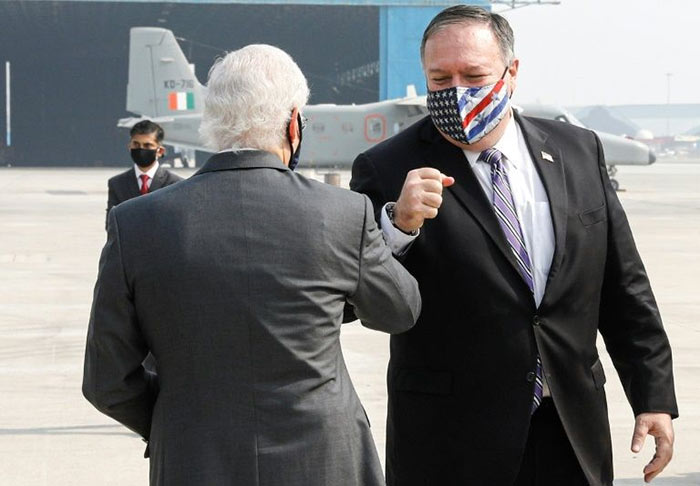Pompeo in India for talks on China ‘threats’

US Secretary of State Mike Pompeo opened talks in India on Monday, kicking off a four-country Asia tour that he has said will focus on the “threats” posed by China.
Pompeo and Defence Secretary Mark Esper, who is joining him for the two-day visit, will meet Prime Minister Narendra Modi on Tuesday amid heightened tensions since a border clash between India and China in June.
Pompeo opened his trip with talks and a dinner with External Affairs Minister Subrahmanyam Jaishankar, who tweeted that relations between the emerging allies have “grown substantially in every domain.”
The State Department said that the two top diplomats discussed “regional security issues” and collaboration on a vaccine against Covid-19, which has hit the two countries hard.
Pompeo and Esper will hold “two-plus-two” talks Tuesday with Jaishankar and Defence Minister Rajnath Singh at which India could raise the need for US cold-weather equipment amid its showdown with China in freezing Himalayan weather.
The world’s two biggest democracies are expected to sign an agreement on sharing geo-spatial intelligence, paving the way for the United States to ship sophisticated missile technology, officials said.
Esper will also be discussing ways to increase cooperation between the two countries’ military forces.
This could include intelligence sharing, stepping up joint exercises, and arms sales — including possibly US F-18 fighter jets.
Pompeo will go on from India to Sri Lanka, the Maldives and Indonesia, all of which have a key role in Indian Ocean maritime traffic where China has cast a greater shadow.
The US secretary of state said ahead of the trip that his meetings would “include discussions on how free nations can work together to thwart threats posed by the Chinese Communist Party”.
Pompeo is accompanied by his wife Susan, who has no official role but frequently has joined him on his foreign travel, drawing scrutiny in Washington.
(AFP)

Latest Headlines in Sri Lanka
- UN pledges support for Sri Lanka’s industrial and SME development March 13, 2025
- Former Boossa Prison Superintendent shot dead in Akmeemana March 13, 2025
- Police search Sagala Ratnayaka’s residence amid hunt for IGP Deshabandu Tennakoon March 13, 2025
- Another Middeniya triple murder suspect arrested at BIA while fleeing March 13, 2025
- Court of Appeal to rule on IGP Tennakoon’s arrest warrant on March 17, 2025 March 12, 2025


